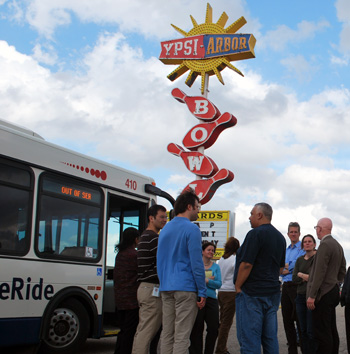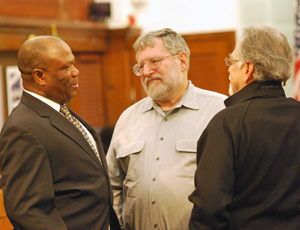On the evening of May 21, the Ann Arbor city council will start its second meeting in May. I’d like to suggest not ending Monday’s meeting on Monday.
That’s right, I’d like to “kick the can down the road.” I suppose it’s a pretty big can. But it’s a short road – only one week.

When kicking the can down the road, be sure it’s a short road and does not contain worms. (Incredible self-portrait action shot by the writer.)
Letting that meeting continue past Monday will be a benefit to the council and Ann Arbor residents, as well as to other public bodies like the Ann Arbor District Library, Washtenaw County, Washtenaw Community College and the Ann Arbor Downtown Development Authority (DDA).
The city charter requires that by the end of that meeting, the council must approve the city budget for fiscal year 2013 – which begins on July 1, 2012. If the council does not act on the budget before the end of the meeting, then according to the city charter, the budget proposed by the city administrator on April 16, 2012 will automatically take effect. Last year, the “second meeting in May” was conducted over the course of sessions on three separate days, and did not end until May 31, 2011.
Last year’s extension of that second meeting in May – achieved by recessing and reconvening on subsequent days – stemmed from the council’s desire to achieve clarity about issues related to the DDA. The issue centered around tax increment finance (TIF) capture, as well as the contract under which the DDA operates the city’s public parking system.
This year, one of the amendments that’s almost certain to be proposed on Monday – by Stephen Kunselman (Ward 3) – revisits the issue of the DDA’s TIF capture, and provides a recurring revenue source for the city to fund two firefighter positions this year, and perhaps more in subsequent years. Kunselman’s amendment calls for the kind of interpretation of the city’s ordinance on DDA TIF capture for which I’ve previously advocated. [See "Column: Tax Capture is a Varsity Sport"]
So this year, I’d like to suggest that city councilmembers plan now to take advantage of the parliamentary option of recessing their May 21 meeting until May 28 – so that they and the public can give thorough consideration to at least nine other budget amendments (in addition to Kunselman’s DDA/firefighter amendment) that could be brought forward on Monday.
The formal public hearing on the budget was already held and closed on May 7, 2012. It enjoyed the participation of just three Ann Arbor residents. By establishing the May 21 session as an occasion to sketch out the intent and the mechanics of proposed budget amendments, the council would better serve the public’s interest in being able to advocate for or against the various proposed amendments to the budget.
I’d also like to use the occasion of this column to lay out the content of some of the fire protection amendments, and to single out Kunselman’s amendment as one that I think especially deserves the entire council’s support. [Full Story]






